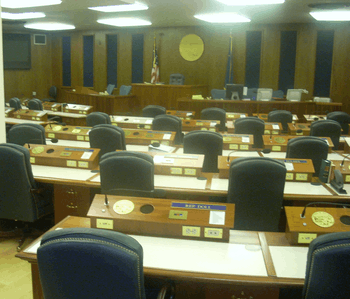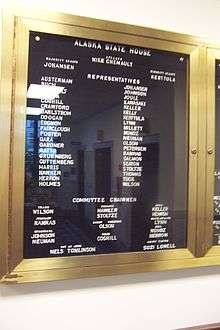Alaska House of Representatives
The Alaska House of Representatives is the lower house in the Alaska Legislature, the state legislature of the U.S. state of Alaska. The House is composed of 40 members, each of whom represents a district of approximately 17,756 people per 2010 Census figures. Members serve two-year terms without term limits. With 40 representatives, the Alaska House is the smallest state legislative lower chamber in the United States.
Alaska House of Representatives | |
|---|---|
| Alaska Legislature | |
 | |
| Type | |
| Type | |
Term limits | None |
| History | |
New session started | January 15, 2019 |
| Leadership | |
Speaker of the House | |
Majority Leader | |
Minority Leader | |
| Structure | |
| Seats | 40 |
.svg.png) | |
Political groups |
|
Length of term | 2 years |
| Authority | Article 2, Alaska Constitution |
| Salary | $50,400/year + per diem |
| Elections | |
| First-past-the-post | |
Last election | November 6, 2018 (40 seats) |
Next election | November 3, 2020 (40 seats) |
| Redistricting | Alaska Redistricting Board |
| Meeting place | |
 | |
| House of Representatives chamber Alaska State Capitol Juneau, Alaska | |
| Website | |
| Alaska House of Representatives | |
The House convenes at the State Capitol in Juneau.
Powers and process
Members of the Alaska House of Representatives are responsible for a portion of the process of making and amending state law. The first step of the legislative process is filing a bill by giving it to the chief clerk of the Alaska House of Representatives.[1] The chief clerk will then assign bills a number.[1]
Bills are introduced and read the first time with the number, sponsor or sponsors, and the title of the bill and then referred to a committee(s).[1] Committee chairs can choose whether or not hear a bill and committees can vote to approve a bill in its original form or make modifications through a committee substitute.[1] Once bills or substitutes are approved, the legislation is referred to the next committee of assignment or to the Rules Committee, which can further amend the bill or assign it to the daily floor calendar.[1]
Once a bill is scheduled on the floor, it appears on the calendar in Second Reading. The bill is again read by number, sponsor or sponsors, and title along with the standing committee reports. A motion is made on the floor to adopt any committee substitutes.[1] Amendments can also be offered and voted on.[1] Third Reading is where the motion is made to vote on the bill.[1]
Senate action
After final passage in the Alaska House of Representatives, a bill is engrossed and sent to the Alaska Senate to go through the same process of introduction, committee referral and three readings. Likewise, bills that have been approved on Third Reading in the Alaska Senate are engrossed and sent to the Alaska House of Representatives.[1]
Enrollment or conference
When a bill is not modified in the second house, it can be sent to the governor on Third Reading, through enrollment. If the bill is modified, the house of origin must vote to accept or reject amendments by the opposite house. A Fourth Reading, in the case of acceptance, will send the bill to the governor, through enrollment. If amendments are rejected, the bill can be sent to conference, where members of the Senate and House hash out a final version and send it to a Fourth Reading in both houses.[1]
Governor and veto override
The governor can choose to sign or veto the legislation. In the case of the veto, a two-third majority of a joint session can override the veto. An appropriations bill requires a three-fourths majority vote in a joint session to override a veto. If signed or approved by a veto override, the legislation becomes law.[1]
Membership
Terms and qualifications
State representatives must be a qualified voter and resident of Alaska for no less than three years, and a resident of the district from which elected for one year immediately preceding filing for office.[2] A state representative must be 21 years of age at the time the oath of office is taken.[2] The Alaska House of Representatives may expel a member with the concurrence of two-thirds of the membership of the house.[2]
Legislative terms begin on the second Monday in January following a presidential election year and on the third Tuesday in January following a gubernatorial election.[3] State representatives serve for terms of two years.[3]
Leadership

The Speaker of the House presides over the House of Representatives. The Speaker is elected by the majority party caucus followed by confirmation of the full House through the passage of a House Resolution. In addition to presiding over the body, the Speaker is also the chief leadership position, and controls the flow of legislation and committee assignments. Other House leaders, such as the majority and minority leaders, are elected by their respective party caucuses relative to their party's strength in the chamber.
| Position | Name | Party | Residence | District |
|---|---|---|---|---|
| Speaker | Bryce Edgmon | Ind | Dillingham | 37 |
| Majority Leader | Steve M. Thompson | Rep-Coalition | Fairbanks | 2 |
| Minority Leader | Lance Pruitt | Rep | Anchorage | 27 |
Current composition
| 17 | 5 | 2 | 15 |
| Republican | Rep. | Ind. | Democratic |
| Affiliation | Party (Shading indicates majority caucus) |
Total | |||||
|---|---|---|---|---|---|---|---|
| Republican | Democratic | Ind | Vacant | ||||
| End of 28th Legislature | 26 | 4 | 10 | 0 | 40 | 0 | |
| Begin 29th Legislature (2015) | 23 | 4 | 12 | 1 | 40 | 0 | |
| End of 29th (2016)[4] | 1 | 22 | |||||
| 30th Legislature | 18 | 3 | 17 | 2 | 40 | 0 | |
| Begin 31st Legislature[5] | 22 | 16 | 1 | 39 | 1 | ||
| January 17, 2019[6] | 23 | 40 | 0 | ||||
| February 13, 2019[7] | 15 | 2 | |||||
| February 14, 2019[8] | 15 | 8 | 15 | 2 | |||
| May 5, 2019[9] | 16 | 7 | |||||
| July 20, 2019[10] | 17 | 6 | |||||
| January 24, 2020[11] | 16 | 39 | 1 | ||||
| February 21, 2020[12] | 17 | 40 | 0 | ||||
| July 31, 2020[13] | 5 | 39 | 1 | ||||
| Latest voting share | 43.6% | 56.4% | |||||
Past partisan compositions can be found on Political party strength in Alaska.
Committees
Current committees include:[14]
|
|
Current members (31st Alaska State Legislature)
| District | Name | Party | Residence | Assumed office |
|---|---|---|---|---|
| 1 | Bart LeBon | Rep-Coalition | Fairbanks | 2019 |
| 2 | Steve Thompson | Rep-Coalition | Fairbanks | 2011 |
| 3 | Mike Prax | Rep | North Pole | 2009↑ |
| 4 | Grier Hopkins | Dem | Fairbanks | 2019 |
| 5 | Adam Wool | Dem | Fairbanks | 2015 |
| 6 | Dave Talerico | Rep | Healy | 2015 |
| 7 | Colleen Sullivan-Leonard | Rep | Wasilla | 2017 |
| 8 | Mark Neuman | Rep | Big Lake | 2005 |
| 9 | George Rauscher | Rep | Palmer | 2017 |
| 10 | David Eastman | Rep | Wasilla | 2017 |
| 11 | DeLena Johnson | Rep | Palmer | 2017 |
| 12 | Cathy Tilton | Rep | Wasilla | 2015 |
| 13 | Sharon Jackson | Rep | Eagle River | 2019↑ |
| 14 | Kelly Merrick | Rep | Eagle River | 2019 |
| 15 | Gabrielle LeDoux | Rep | Anchorage | 2013 |
| 16 | Ivy Spohnholz | Dem | Anchorage | 2016↑ |
| 17 | Andy Josephson | Dem | Anchorage | 2013 |
| 18 | Harriet Drummond | Dem | Anchorage | 2013 |
| 19 | Geran Tarr | Dem | Anchorage | 2013 |
| 20 | Zack Fields | Dem | Anchorage | 2019 |
| 21 | Matt Claman | Dem | Anchorage | 2015 |
| 22 | Sara Rasmussen | Rep | Anchorage | 2019 |
| 23 | Chris Tuck | Dem | Anchorage | 2009 |
| 24 | Chuck Kopp | Rep-Coalition | Anchorage | 2017 |
| 25 | Mel Gillis | Rep | Anchorage | 2019 |
| 26 | Laddie Shaw | Rep | Anchorage | 2019 |
| 27 | Lance Pruitt | Rep | Anchorage | 2011 |
| 28 | Jennifer Johnston | Rep-Coalition | Anchorage | 2017 |
| 29 | Ben Carpenter | Rep | Nikiski | 2019 |
| 30 | Vacant | Rep | ||
| 31 | Sarah Vance | Rep | Homer | 2019 |
| 32 | Louise Stutes | Rep-Coalition | Kodiak | 2015 |
| 33 | Sara Hannan | Dem | Juneau | 2019 |
| 34 | Andi Story | Dem | Juneau | 2019 |
| 35 | Jonathan Kreiss-Tomkins | Dem | Sitka | 2013 |
| 36 | Dan Ortiz | Ind | Ketchikan | 2015 |
| 37 | Bryce Edgmon | Ind | Dillingham | 2007 |
| 38 | Tiffany Zulkosky | Dem | Bethel | 2018↑ |
| 39 | Neal Foster | Dem | Nome | 2009↑ |
| 40 | John Lincoln | Dem | Kotzebue | 2018↑ |
- ↑ Member was originally appointed.
Past composition of the House of Representatives
References
- Legislative Process, Alaska Legislature (accessed April 27, 2013)
- Alaska Handbook to State Government (accessed April 25, 2013)
- Article 2 of the Alaska Constitution, Lieutenant Governor's Office (accessed April 26, 2013)
- "Reinbold booted from caucus". Archived from the original on April 14, 2015. Retrieved April 8, 2015.
- Republican representative-elect Nancy Dahlstrom (District 18) was appointed Commissioner of the Department of Corrections before the start of session. Gov. Mike Dunleavy appointed Republican Sharon Jackson to replace Dahlstrom, but without elected officers, the appointment could not be received.
- Sharon Jackson's appointment is confirmed.
- Bryce Edgmon changed party registration from Democratic to Undeclared.
- Majority coalition elected.
- Republican Gabrielle LeDoux (District 15) leaves the majority coalition .
- Republican Tammie Wilson (District 3) leaves the majority coalition.
- Republican Tammie Wilson (District 3) resigns.
- Republican Mike Prax appointed to succeed Wilson.
- Republican Gary Knopp died in a plane collision.
- "Alaska House Committees". Open States. Sunlight Foundation. April 9, 2014. Retrieved April 9, 2014.
External links
- Alaska Legislature
- Alaska House Republicans House Republicans website
- Alaska House Majority Coalition Majority Coalition website (Coalition of Democrats, Independents and Republicans)